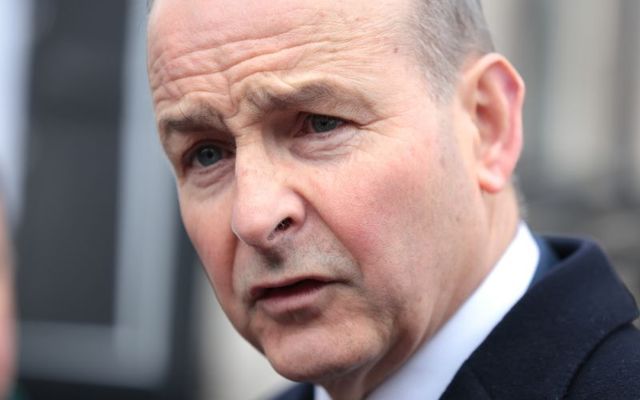Ireland’s Tánaiste, Minister for Foreign Affairs, and Minister for Defence Micheál Martin TD announced today, March 27, that Ireland will intervene in the case initiated by South Africa against Israel under the Genocide Convention at the International Court of Justice.
Ireland's Department of Foreign Affairs said on Wednesday that following analysis of the legal and policy issues arising in the case, and consultation with partners, including South Africa, the Tánaiste has directed officials to commence work on a Declaration of Intervention under Article 63 of the Statute of the International Court of Justice.
The intention is that the Declaration of Intervention, which will require Government approval, will be filed once South Africa has filed its Memorial, the DFA said on Wednesday.
"This is likely to take a number of months," the DFA said. "Ireland will liaise closely with a number of partners who have also confirmed their intention to intervene, as we prepare our intervention."
Speaking on Wednesday, the Tánaiste said: “Following the Provisional Measures ordered by the Court on 26 January, the Government confirmed its intention to urgently consider filing a declaration of intervention in this case with the International Court of Justice, based on a legal analysis of the Genocide Convention, the Court’s provisional measures order and consultation with other Contracting Parties.
“That analysis and consultation has now concluded. Ireland will be intervening.
“As I said in the Dáil last month, intervention as a third party in a case before the International Court of Justice is a complex matter and is relatively rare. Since 1948, only four other interstate cases have been initiated under the Genocide Convention before the International Court of Justice. Ireland intervened in one of these - the Ukraine v Russia case – and, after a rigorous and comprehensive process of analysis and consultation over the last six weeks, we have determined that we will do so again in the South Africa v Israel case.
“It is for the Court to determine whether genocide is being committed. But I want to be clear in reiterating what I have said many times in the last few months; what we saw on 7 October in Israel, and what we are seeing in Gaza now, represents the blatant violation of international humanitarian law on a mass scale.
“The taking of hostages. The purposeful withholding of humanitarian assistance to civilians. The targeting of civilians and of civilian infrastructure. The indiscriminate use of explosive weapons in populated areas. The use of civilian objects for military purposes. The collective punishment of an entire population.
“The list goes on. It has to stop. The view of the international community is clear. Enough is enough. The UN Security Council has demanded an immediate ceasefire, the unconditional release of hostages and the lifting of all barriers to the provision of humanitarian assistance at scale. The European Council has echoed this call.
“The situation could not be more stark; half the population of Gaza face imminent famine and 100% of the population face acute food insecurity.
"As the UN Secretary General said as he inspected long lines of blocked relief trucks waiting to enter Gaza during his visit to Rafah at the weekend; ‘it is time to truly flood Gaza with life-saving aid. The choice is clear: surge or starvation’.
"I echo his words today.”
Tánaiste @MichealMartinTD has announced that Ireland will intervene in the case initiated by South Africa against Israel under the Genocide Convention at the International Court of Justice. https://t.co/f3K6sU2hIN
— Irish Foreign Ministry (@dfatirl) March 27, 2024
In December, South Africa filed an application instituting proceedings against Israel, alleging that Israel "in relation to Palestinians in Gaza, is in violation of its obligations under the Genocide Convention.”
In January, the ICJ ordered that Israel take measures to prevent genocide in Gaza and enable the provision of basic services and humanitarian assistance in the Gaza Strip. Israel was also ordered to submit a report to the ICJ in one month outlining its efforts to adhere to the ICJ's orders.
The Tanaiste "strongly welcomed" the ICJ's orders in January.
"These are measures that Ireland has been consistently calling for from the start of this conflict," he said on January 26.
He added: "As agreed by the Dáil earlier this week, the Government will strongly consider intervention in the case, following detailed analysis of the Court’s decision today.
"I have therefore asked my officials to prepare legal advice for my consideration on an urgent basis."
Earlier in January, before the ICJ issued its orders on the request for provisional measures, Taoiseach Leo Varadkar said that Ireland "does not intend" to join the ICJ proceedings.
"I really think this is an area where we need to be very careful," Varadkar said while speaking on RTÉ Radio.
“What’s happened in Gaza is appalling - over 20,000 people killed, mostly innocent civilians, mostly women and children, very possibly war crimes committed both by Israel and Hamas when it comes to the events of the last few months.
"Genocide is something very particular. It is defined as an attempt, a deliberate attempt to destroy an entire nation, an entire race, or to do so in large part.
“And one group of people that has experienced that in the world are Jewish people, the Holocaust. Six million Jews killed here in Europe, and Hitler had a plan to kill many millions more – that is genocide."
Varadkar added: "We need to be very careful about genocide in that context."
He said the international court will determine whether or not the situation in Gaza is genocide.




Comments